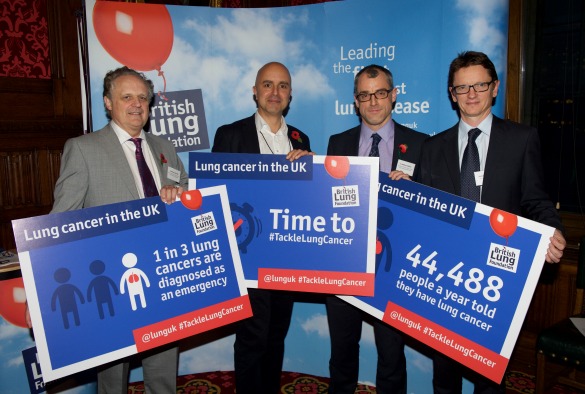The British Lung Foundation (BLF) Expert Working Group has revealed that a third of all lung cancer patients are diagnosed in emergency clinics, which is significantly higher than for any other cancer.
Earlier this month lung cancer experts called for action on tackling emergency presentation of lung cancer, launching a high profile report and series of recommendations at a British Lung Foundation (BLF) Parliamentary event.
Professor John Field, a lung cancer expert from the University’s Department of Molecular and Clinical Cancer Medicine in the Institute of Translational Medicine contributed to the report, which calls for more to be done to detect lung cancer earlier.
Biggest cancer killer
Tackling Emergency Presentation of Lung Cancer: An Expert Working Group Report and Recommendations, published by the BLF to coincide with Lung Cancer Awareness Month, has found that 34% of patients are diagnosed in an emergency, when there is a reduced chance of receiving curative treatment.
Lung cancer is the UK’s biggest cancer killer, accounting for one in five of all cancer deaths. Survival rates in this country lag behind those in Europe and the US, with just one in ten patients in the UK surviving for five years post-diagnosis. This is the devastating effect of late presentation and diagnosis.
In 2011, Professor Field launched the UK Lung cancer CT Screening Trial (UKLS) to investigate if a lung cancer screening programme could be implemented effectively at hospitals and cancer centres across the UK (www.UKLS.org).
Risk prediction
The UKLS pilot screening trial, which was the first lung cancer screen trial to take place in the UK was aimed to benefit people who are at risk of developing lung cancer. The UKLS trial provides in depth information on how to set up a national lung cancer CT screening programme, including using a risk prediction model to identify high risk individuals in the population, use of volumetric analysis of CT detected nodules and a pathway for the management of indeterminate nodules. The results of the UKLS trial will be published shortly.
The BLF Expert report proposes a number of ways in which to improve this prognosis and enhance patient experience.
Recommendations include:
• Funding for a national awareness campaign
• A commitment to rapid adoption of a targeted, evidenced-based lung cancer screening programme
• Lung cancer risk assessment and clinical decision support tools tested and made available in all primary care practices
• Introduce a timed pathway for patients with suspected lung cancer admitted as an emergency
• Rapid access outpatient pathways introduced to prevent unnecessary emergency admissions
• GPs able to make direct access referrals for CT scans for patients with suspected lung cancer
• All chest x-rays and CT scans formally reported within four days, and local systems in place to trigger referrals to a specialist Rapid Access Lung Cancer clinic
• GP practices and secondary care consultants to share access to their direct telephone or email addresses to speed discussion about high risk cases
• Centralised systems set up in order to ensure data can be shared
• A Clinical Nurse Specialist (CNS) available to all patients suspected to have lung cancer
• All patients diagnosed in an emergency setting seen within 24 hours by an Acute Oncology Nurse.
Major impact
Professor John Field, Clinical Professor of Molecular Oncology and the Chief Investigator of the UK lung cancer Screening trial (UKLS), said: “The implementation of these recommendations would make a major impact on the diagnosis of lung cancer at an earlier stage, which would greatly improve the success of treatment and the survival rates of those affected by this terrible disease.”
Barbara Keeley, Shadow Health Minister, said: “We must take action now to reduce the number of people diagnosed through emergency routes and ensuring that once diagnosed, people with lung cancer swiftly receive the best care and treatment from the NHS. It could really mean the difference between life and death.”
A copy of the full report can be found here http://bit.ly/1Qfzyho
